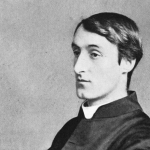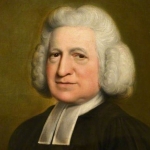Now I begin to know at last,
These nights when I sit down to rhyme,
The form and measure of that vast
And leaps me through his paper hoops
A little higher every time.
Tempts me to think I’ll grow a proper
Singing cricket or grass-hopper
Making prodigious jumps in air
While shaken crowds about me stare
Aghast, and I sing, growing bolder
To fly up on my master’s shoulder
Rustling the thick stands of his hair.
He is older than the seas,
Older than the plains and hills,
And older than the light that spills
From the sun’s hot wheel on these.
He wakes the gale that tears your trees,
He sings to you from window sills.
At you he roars, or he will coo,
He shouts and screams when hell is hot,
Riding on the shell and shot.
He smites you down, he succours you,
And where you seek him, he is not.
To-day I see he has two heads
Like Janus—calm, benignant, this;
That, grim and scowling: his beard spreads
From chin to chin: this god has power
Immeasurable at every hour:
He first taight lovers how to kiss,
He brings down sunshine after shower,
Thunder and hate are his also,
He is YES and he is NO.
The black beard spoke and said to me,
‘Human fraility though you be,
Yet shout and crack your whip, be harsh!
They’ll obey you in the end:
Hill and field, river and marsh
Shall obey you, hop and skip
At the terrour of your whip,
To your gales of anger bend.’
The pale beard spoke and said in turn
‘True: a prize goes to the stern,
But sing and laugh and easily run
Through the wide airs of my plain,
Bathe in my waters, drink my sun,
And draw my creatures with soft song;
They shall follow you along
Graciously with no doubt or pain.’
Then speaking from his double head
The glorious fearful monster said
‘I am YES and I am NO,
Black as pitch and white as snow,
love me, hate me, reconcile
Hate with love, perfect with vile,
So equal justice shall be done
nature for you shall curse or smile:
A poet you shall be, my son.’



















Comment form: